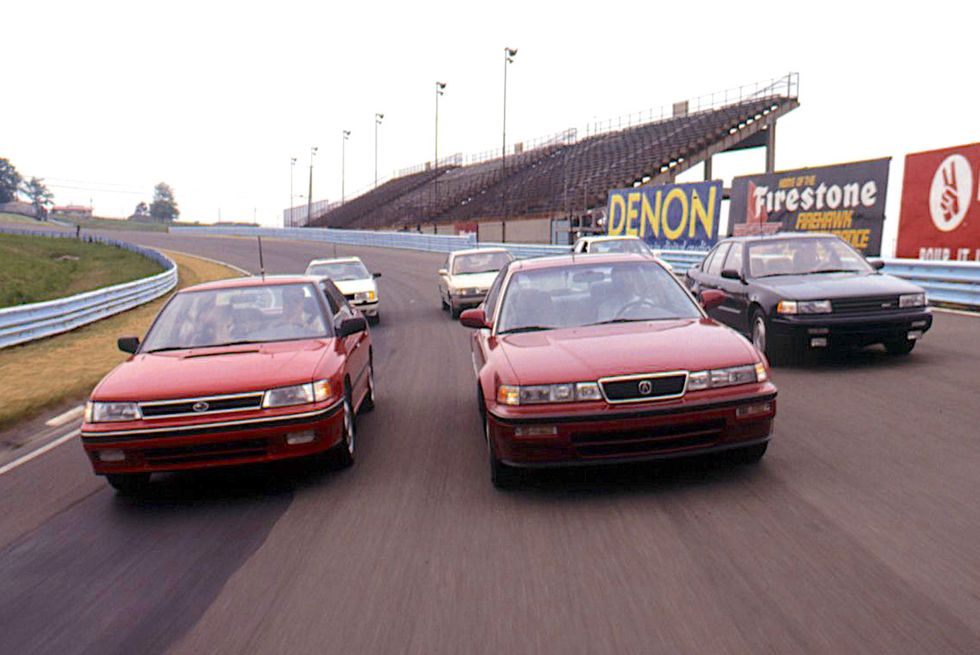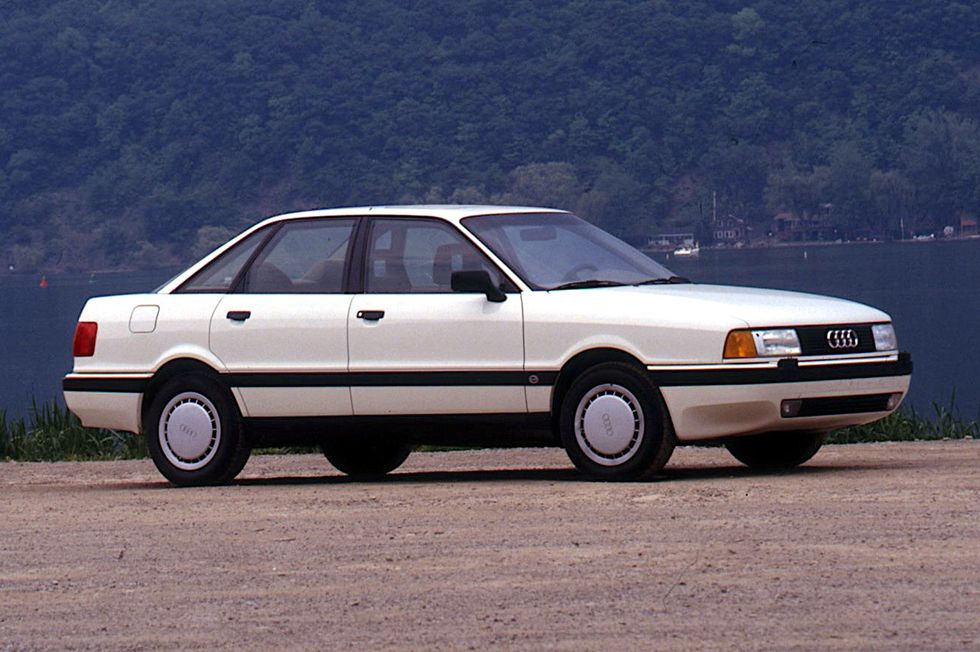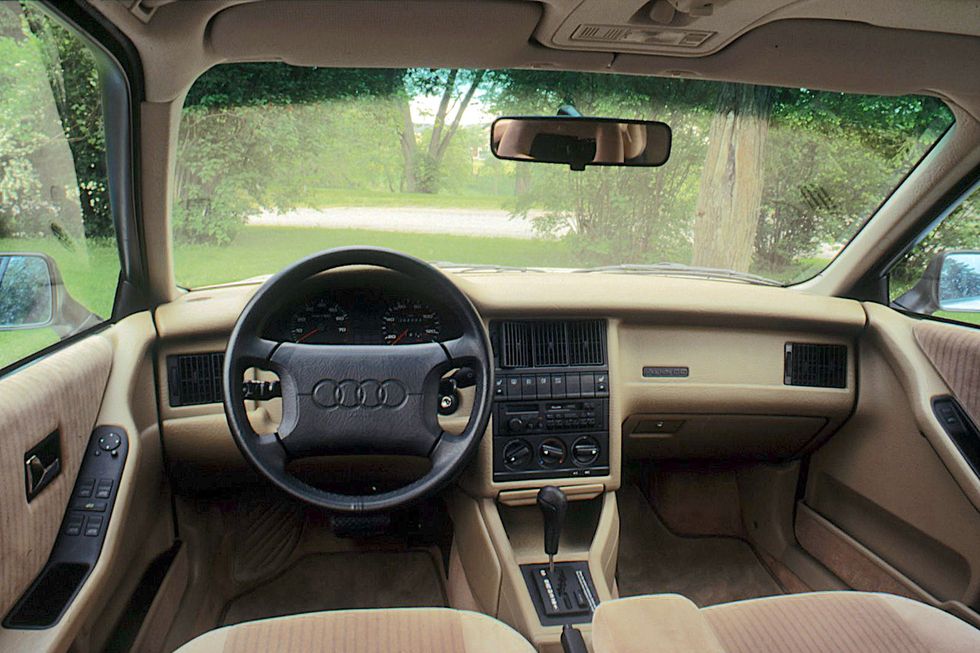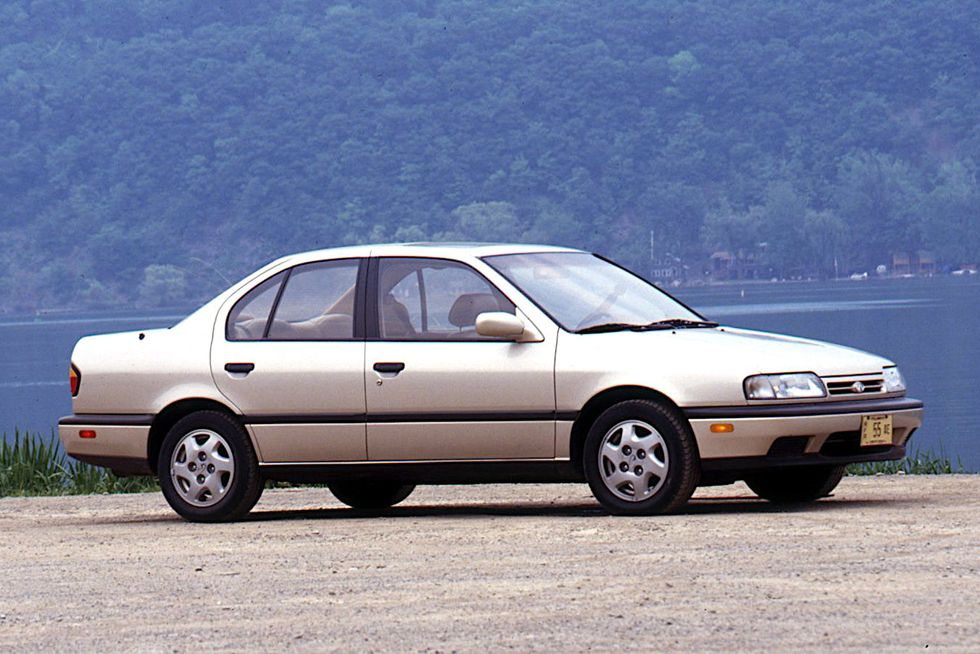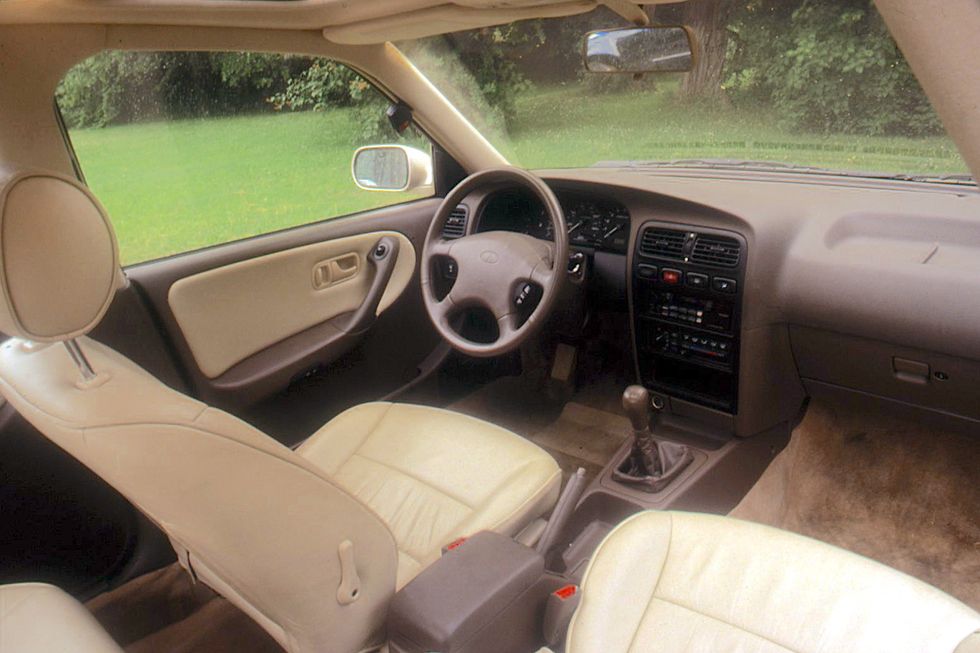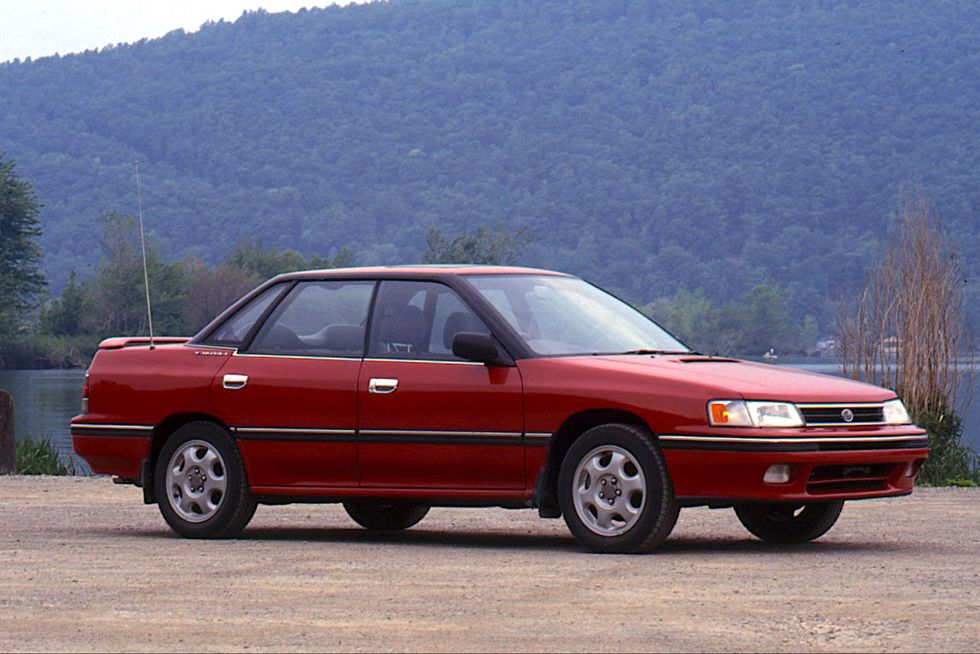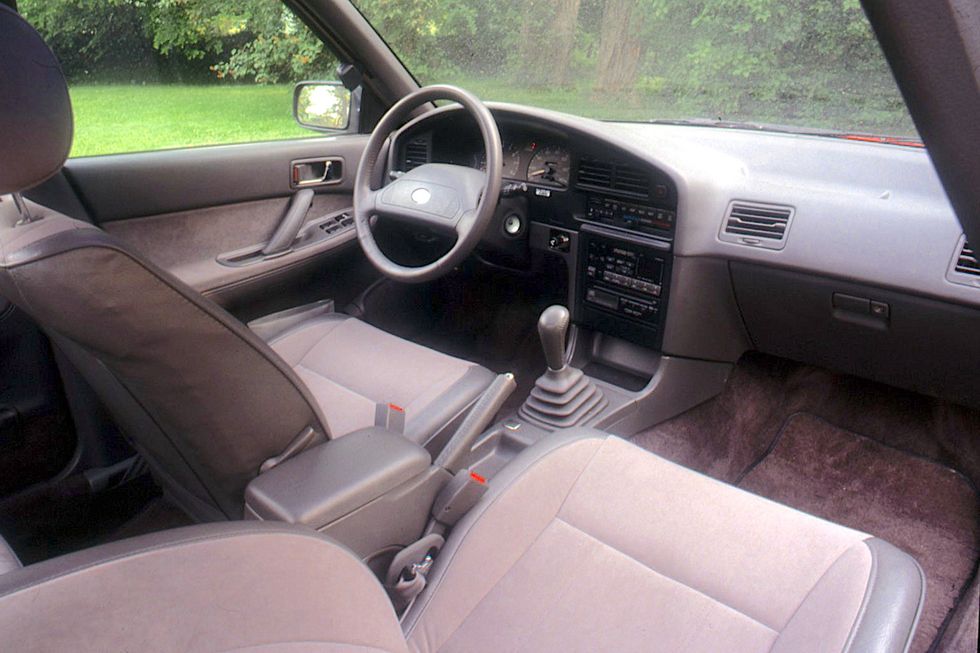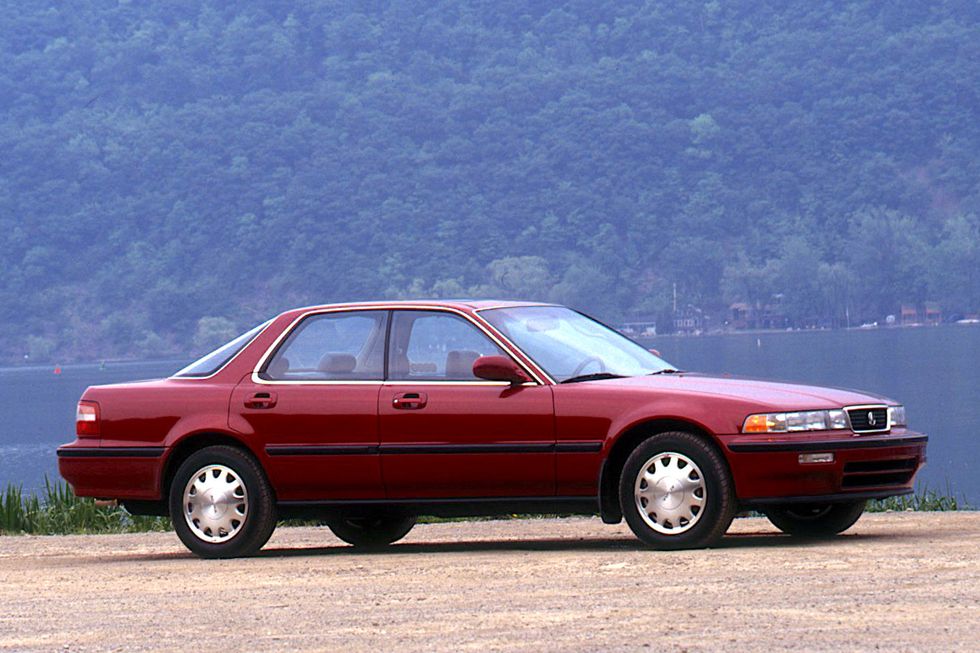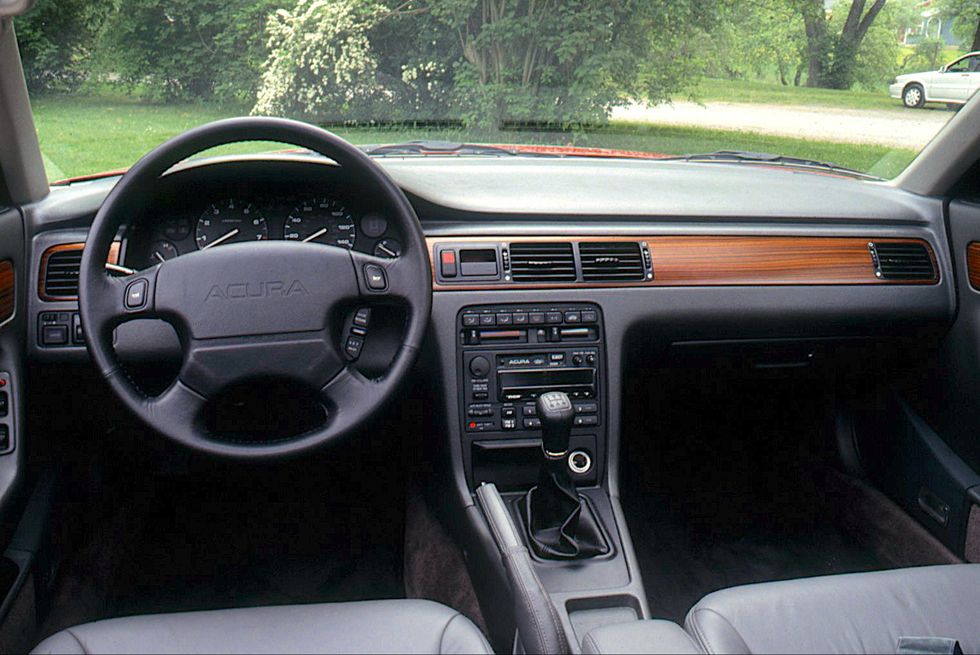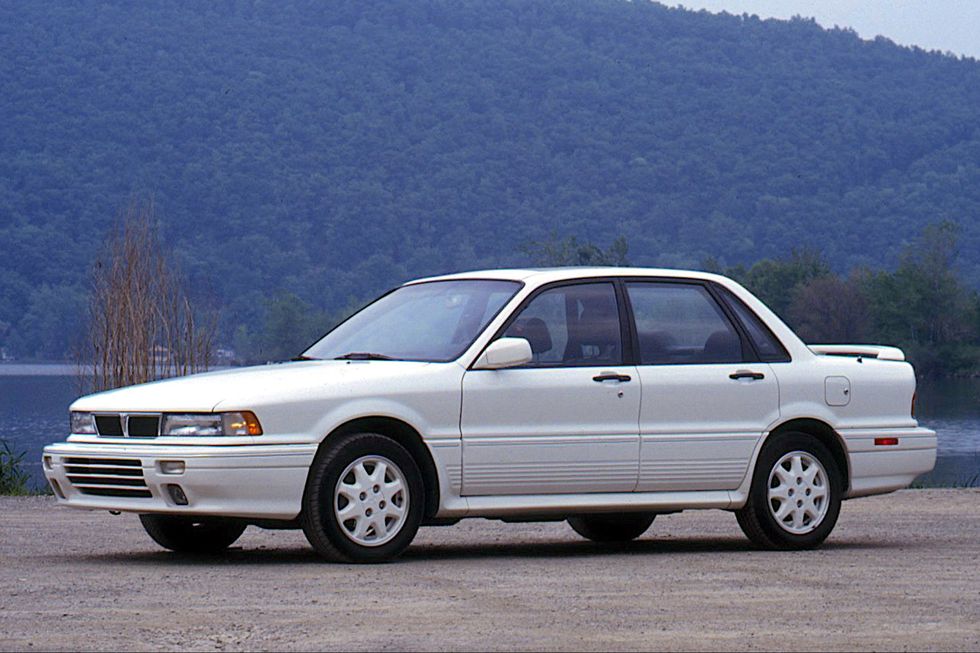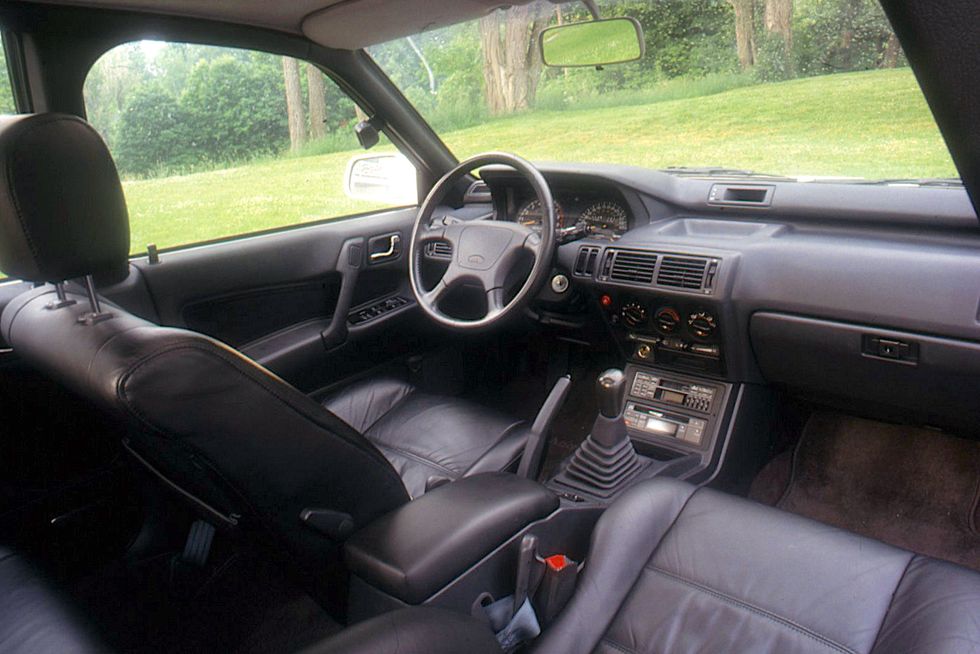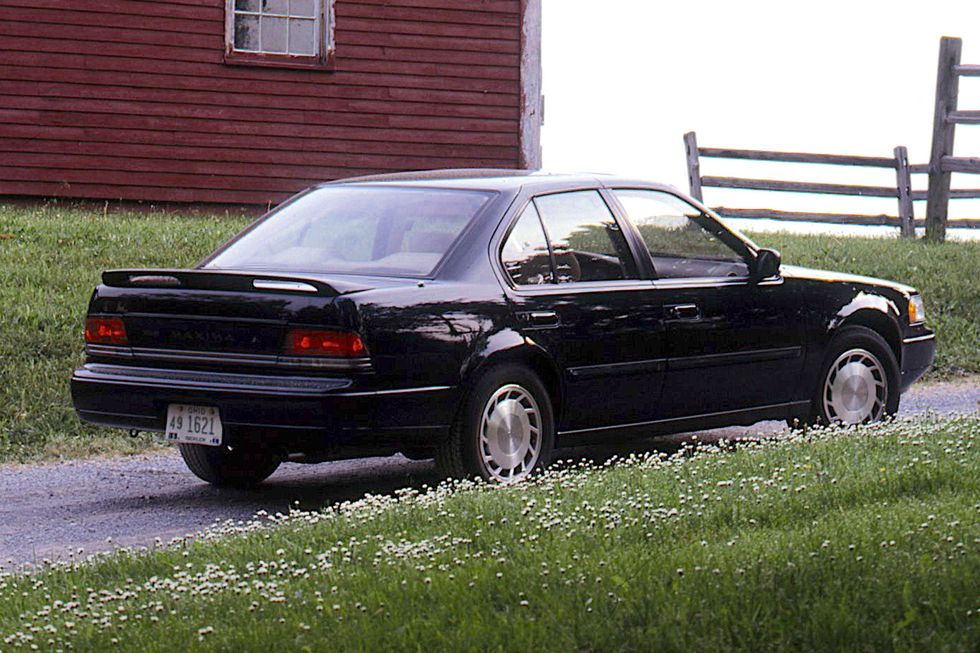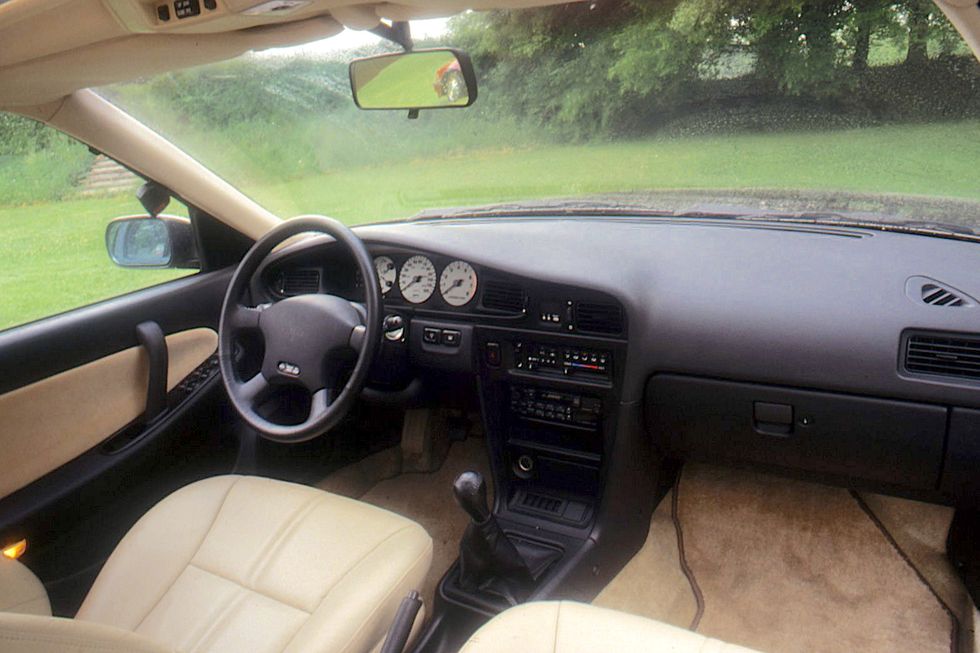From the September 1991 issue of Car and Driver.
The scene was right out of One Flew Over the Cuckoo’s Nest. Ten Car and Driver editors spritzing and lolling atop Brock Yates’s 38-foot-long charter boat, the Bluewater Challenger, which Yates—in true Hemingway style—calls “one big, tough fishing machine.” Yates was at the helm, somehow persuaded that we could hook fish at 40 mph and looking for all the world like Jack Nicholson shepherding a boatload of inmates across icy Lake Ontario. And the inmates were jabbering about cars, not lake trout, except for our managing editor, who felt compelled to troll with his face, which is why there is now 85 feet of Lake Ontario water between him and his eyeglasses.
We had driven to upper New York state, to Yates’s sprawling real-estate empire in the village of Wyoming, to wring out a six-pack of imported sports sedans that each cost $25,000 or less. The driving itinerary was a brute: street circuits through the Ann Arbor and Detroit minefields, ten hours of freeway droning to and from the Village That Yates Owns, a seven-hour thrash through the glacially gouged hills surrounding the Finger Lakes, and even a few laps—in formation, no less—around Watkins Glen (the latter maneuver performed flawlessly in front of a bevy of understandably mystified students attending one of Bobby Rahal’s Track Time sessions).
Twenty-five thousand bucks may sound like a bundle, but this is a wildly competitive and popular niche, and none of these cars even qualifies as a luxury sedan by today’s standards.
Our six-pack challengers, in order of price (most expensive to least expensive) were: the Acura Vigor LS, the Audi 80, the Mitsubishi Galant VR4, the Nissan Maxima SE, the Subaru Legacy Sport Sedan, and the Infiniti G20. Each was already a winner, because before we got started, we studied and drove other contenders: cars such as the BMW 318i, the Mazda 929, the VW Passat GL, the Peugeot 405Mi 16, the Saab 900S, and the Volvo 740 Turbo. But those machines—for reasons of age, sloth, or other character quirks judged unsuitable in a stab-and-squirt sports-sedan outing—were culled early.
Finally, the idea was to pit the winning import against America’s own star-spangled banger, the $22,071 Ford Taurus SHO, which had been a decisive victor in our “Yankee Clippers” shoot-out in March.
As our seven-car caravan got under way—CB radio squawking, map being sucked out of open windows, and the inexplicable appearance of two sets of keys for which there existed no cars—Yates muttered, “My most fervent hope is that I’ll simply be thrown clear.” A cruel sentiment, really, because at that point in the proceedings, we had yet to touch his boat.
6th Place: Audi 80
Absolutely true: Audi builds no automobile that we don’t enjoy driving. Also absolutely true: In this group, the Audi 80, now even blessed with a much-needed five-cylinder engine, took a beating that would have kept George Foreman off the David Letterman show for seven months.
Although a manual is theoretically available, Audi doesn’t want to sell this car with any transmission except a four-speed automatic, making it the only non-manual in our sextet. But even a five-speed stickshift wouldn’t have upended many votes.
HIGHS: Modern styling, typically Teutonic fit and finish.
LOWS: Thrashy engine and an unwilling transmission.
VERDICT: Expertly built, but low on fun, short on utility.
The Audi required the most time to attain 60 mph and to trip the lights through the quarter-mile. Requiring 203 feet to stop from 70 mph, it offered the least impressive braking. Shod with 175/70R-14 tires that looked like space-saver spares, it screeched its way around the skidpad with the most meager grip. Its narrow cabin and high cowl made for cramped seating and passengers muttering about impending panics of claustrophobia. And its ten-cubic-foot trunk is more accurately described as a storage slot for attaché cases. All of which makes it tricky to justify the Audi’s sticker, which is the second steepest in this test.
Wrote our editor, William Jeanes: “There may be adequate horsepower in there, but it obviously disagrees with the transmission.” He’s right. The automatic permits sloppy overrevs on many upshifts and a not-very-positive sense of manual control when you want it. Too much work, too much busyness to get at the power.
The Audi averted outright ridicule because of its superb fit and finish, great freeway tracking, still-modern aero styling, and vault-like build quality—which made it another ingot from Ingolstadt.
Alas, the little 80’s fate was sealed when, over the steamy Memorial Day weekend, its radiator fan “roared like a Channel hovercraft,” said Yates, and its AM radio was the only one in our group unable to lock onto the station broadcasting the Indy 500. Golly.
1991 Audi 80
130-hp inline-5, 4-speed automatic, 2898 lb
Base/as-tested price: $22,250/$24,395
C/D TEST RESULTS
60 mph: 9.7 sec
1/4-mile: 17.5 sec @ 80 mph
100 mph: 32.2 sec
Braking, 70–0 mph: 203 ft
Roadholding, 300-ft-dia skidpad: 0.74 g
C/D observed fuel economy: 24 mpg
5th Place: Infiniti G20
When you first clap eyes on the G20, with its Wonder Bread styling and compact dimensions, it is tempting to label it as some sort of Infiniti inventory tag-along. Big mistake. Go for a spin and here’s what you find: Maybe the best, most accurate five-speed shifter in the world, mated to a smooth and light clutch. Steering surpassed only by vehicles assembled in Zuffenhausen. And a suspension that makes this car so inordinately pitchable and tossable that you’d swear the same guys designed the underbits on, say, the Nissan 300ZX. Which they did.
HIGHS: Steering, shifter, and suspension of racing-car caliber.
LOWS: Noisy engine, minimal low-rev power, Iowa styling.
VERDICT: Can’t compete with its V-6-powered big brother.
The G20 is the shortest and lightest car in this group, the fastest through the slalom, and the hands-down victor in fuel economy. What’s more, it is the least expensive car in our sextet.
So how come it finished fifth?
The all-alloy four-cylinder engine in the G20 is noisy. Extraordinarily smooth, mind you, with Tae Kwon Do–reflex throttle response. But noisy. And it is prone to drone, because to get at the power everybody keeps the tach twisted, as often as possible, somewhere north of 4000 rpm.
Other repeated observations in our logbook: The motorized belts are annoying, as are the trio of hard-to-reach knurled knobs on the side of the driver’s seat for cushion height, rake, and backrest angle.
In this group, the G20 is our sedan of choice for slicing through knots of urban traffic, but its conservative appointments and modest performance squeeze it out of the niche occupied by elegant long-distance tourers like the Maxima and the Vigor. Frankly, the G20 ought to compete with, say, the Accord, where it would do some serious damage to Honda.
When we were first shown the littlest Infiniti (known elsewhere in the world as a mere Nissan), we asked the marketing guys, “Haven’t you already built a great $20,000 sedan called the Maxima, with a standard V-6?” The Nissan guys replied, “Nobody will ever compare the two.”
We just did.
1991 Infiniti G20
140-hp inline-4, 5-speed manual, 2865 lb
Base/as-tested price: $18,135/$19,835
C/D TEST RESULTS
60 mph: 8.7 sec
1/4 mile: 16.8 sec @ 83 mph
100 mph: 27.7 sec
Braking, 70–0 mph: 182 ft
Roadholding, 300-ft-dia skidpad: 0.78 g
C/D observed fuel economy: 28 mpg
4th Place: Subaru Legacy Sport Sedan
We once described the Subaru Legacy as a car we respect more than we desire, and that inscription remains apt. Four-wheel drive and anti-lock brakes are standard on the Sport Sedan—this on the second-least-expensive automobile in the group—and neither is mere marketing gimmickry. The Legacy was an outright winner in braking from 70 mph. With the most favorable weight distribution of the bunch, it circulated our 300-foot skidpad with the greatest grip. And its turbocharged four-cylinder boxer absolutely does not feel force-fed, delivering a seamless, if somewhat gritty-sounding, flow of power from 2000 to 6000 rpm and carrying this car to 60 mph sooner than the Maxima’s V-6.
HIGHS: Compliant ride, sharp steering, four-wheel drive.
LOWS: Poor detailing, hit-and-miss styling, rubbery shifter.
VERDICT: Good value, short in fire and finesse.
Details are the Legacy’s downfall. Nothing wrong with the car’s overall silhouette, but it is spoiled by fussy cutlines and gratuitous chrome accents: a trio of strips around the taillights, for example, along with chrome door handles and that shiny logo at the base of the C-pillars. Same deal inside. Basically a sensible layout, whose logic and legibility are eroded by buttons and switches that don’t match and vast expanses of tacky plastic—on the doorsills, the instrument panel, the A-pillars, the sun visors, the headliner, and the center console. By the time you discover the ridiculously flimsy passenger-side air vent (is this maybe a part from Mattel?) and row through the gears—only to find the linkage a little rubbery and insubstantial—you begin to wonder if anyone at Subaru has heard that expression “sweating the details.”
What they have heard, fortunately, is the word “utility.” In this group, only the Legacy and the Maxima deliver a rear seat capable of accommodating three adults. The Subaru’s trunk is cavernous. And if this test had been conducted in icy February, the Legacy’s utility rating might well have clawed its way to triple digits.
1991 Subaru Legacy Sport Sedan
160-hp flat-4, 5-speed manual, 3150 lb
Base/as-tested price: $19,748/$20,702
C/D TEST RESULTS
60 mph: 7.9 sec
1/4 mile: 16.4 sec @ 85 mph
100 mph: 23.9 sec
Braking, 70–0 mph: 173 ft
Roadholding, 300-ft-dia skidpad: 0.81 g
C/D observed fuel economy: 22 mpg
3rd Place: Acura Vigor LS
We try to approach these comparison tests with no festering notions about probable winners. But a bunch of us who had yet to sit in a Vigor reckoned we could expect near-perfection. In short, a probable winner.
Ha! Just goes to show that our editors really do fret over dollars. Because the Vigor’s big weakness is its vigorous price. At $23,575, it is the most expensive sedan in the six-pack, yet it is the cheapest version of the Vigor extant, with no leather, sunroof, or power seats. Of course, for this kind of money, what you do get is the fruit of Honda’s engineers, doing what Honda engineers do best. The Vigor emerged a victor in our fit-and-finish category and tied for first in both ergonomics and comfort. The feel, location, and movements of the switchgear are faultless. The shift linkage is as silky as the Infiniti G20’s but with shorter throws. The tactile sensations—abetted by the wood inserts on the dash and doors—create an interior as inviting as Orson Welles’s den.
HIGHS: Ball-bearing shifter, silky switchgear, flawless ergonomics.
LOWS: Price, numb steering, price, slalom manners, price.
VERDICT: High-zoot evolution of a Honda Accord EX, but at a major cost.
Speaking of which. The Vigor is clearly the one car in this group that makes you feel cretinous if you aren’t wearing a Ralph Lauren button-down shirt. Despite its 176-hp five-cylinder engine, the Vigor traveled through our 1000-foot slalom at the lowest speed, and its overassisted power steering rewards Wall Street deliberation, not high-spiritedness. Said Jeanes, “It is almost, but not quite, as thrilling to drive as a riding lawn mower, though it is of course much quieter.”
Moreover, the Vigor’s cockpit is cramped, this despite the car’s exterior bulk: It is the longest and widest car in this group, and it has the longest wheelbase. The villain, of course, is the north/south engine installation, which requires a deep dashboard, insinuates a mammoth transmission between the front seats, and reduces the footwells to narrow, dark slots. We also wish the hood didn’t shake like a wet springer spaniel—an un-Honda-like touch.
This is nonetheless an alluring car for the driver who wants to combine anonymity with quality. A class act all the way, posh and polished, but one that needs a lower sticker to earn our editorial thumbs-up.
1991 Acura Vigor LS
176-hp inline-5, 5-speed manual, 3104 lb
Base/as-tested price: $23,575/$23,575
C/D TEST RESULTS
60 mph: 7.7 sec
1/4 mile: 16.1 sec @ 88 mph
100 mph: 21.7 sec
Braking, 70–0 mph: 198 ft
Roadholding, 300-ft-dia skidpad: 0.76 g
C/D observed fuel economy: 23 mpg
2nd Place: Mitsubishi Galant VR4
Having just demonstrated editorial restraint—chiding Acura for the price of its Vigor—we now demonstrate irresponsibility at its finest. The bribe we never fail to grab: horsepower.
What we have here is the hot rod of the group (or, what Mitsubishi actually intended, the rallyist of the group). This is the Hemi Cuda approach to sports-sedan motoring. Just look at the numbers: quickest 0-to-60-time (at 7.0 seconds, it’s as fast as a Ford Probe GT), best quarter-mile ET, and a 132-mph top speed, a velocity that even the V-6-powered Maxima cannot attain.
HIGHS: Schwarzkopf-quality power and four-wheel steering.
LOWS: Sloppy shifter, styling by, ah, Frigidaire?
VERDICT: The sports sedan for PRO Rally Saturdays and NHRA Sundays.
What’s more, in the Mitsubishi tradition, this car is loaded with, well, all of Mitsubishi’s stuff. Four-wheel independent suspension, four-wheel disc brakes, four-wheel steering, four-wheel ABS, four valves per cylinder. “It should say 4WGE on the rump,” opined editor-at-large Kevin Smith. “Four-Wheel Goddamn Everything.”
Of course, all that stuff makes the VR4 the heaviest sedan in the group, and all that stuff comes in a perversely angular wrapper. “From the spectator’s seat,” said Jeanes, “the VR4 shows you the kind of exterior treatment that GM once thought represented zoominess incarnate. Now it just looks kind of silly.” Same deal inside, with a clunky shifter and a bizarre instrument panel buried under a jutting pod that could have been designed in the late 1970s. Saving the cockpit from brickbats are its front seats, which go a long way toward making the VR4’s racy demeanor tolerable.
And racy it is, with the heaviest steering of our six sedans and a twitchy chassis that is sufficiently stiff (and loud) that you know everything about the road surfaces. Which, of course, made this our car of choice as we rocketed over hill and through Dale. (Dale, New York, that is, where Yates showed us this country’s smallest post office—the size of the Audi 80—complete with what Brock asserts is a zip code whose last digit is not a whole number.)
The VR4 is not notably refined. We began calling it the Jack Klugman of the group. But you get a lot of stuff, you know? A hot rod, pure and simple. And, with only 2000 VR4s imported annually, a rare hot rod. We are such suckers for power.
1991 Mitsubishi Galant VR4
195-hp inline-4, 5-speed manual, 3389 lb
Base/as-tested price: $22,168/$23,652
C/D TEST RESULTS
60 mph: 7.0 sec
1/4 mile: 15.6 sec @ 88 mph
100 mph: 21.9 sec
Braking, 70–0 mph: 183 ft
Roadholding, 300-ft-dia skidpad: 0.78 g
C/D observed fuel economy: 23 mpg
1st Place: Nissan Maxima SE
And the winner is . . . an old car. Well, old by today’s standards. We first climbed into the current-generation Maxima at Nissan’s Phoenix test track in the summer of ’88. That means this amazingly competent and mature-feeling sedan is in the final year of its life. Spy photos of its replacement are already appearing.
Which makes you wonder if Nissan is going to screw up a good thing, because there is a lot here to covet: a real sense of spaciousness in the cockpit, for example. Three adults fit in the back. And the trunk, in the words of James Thurber, “would be a wonderful place for a weekend or to learn to play the xylophone.”
HIGHS: Perfect power delivery, great steering, room for five.
LOWS: Excess body roll, cheap-and-noisy motorized belts.
VERDICT: Sophistication and refinement beyond its price.
What’s more, the Maxima offers the only V-6 in this six-pack, which is evident the moment you twist the ignition key. The idle is the smoothest here, and there is prodigious step-off torque. Power is on tap from as low as 1500 rpm—a real boon around town. And despite this engine’s post-4000-rpm growl, under normal conditions it is so unobtrusive—demonstrably the quietest at full throttle of the six cars tested—that on the Interstate we often found ourselves forgetting to upshift from fourth.
Like the Vigor, the Maxima has uniformly buttery controls. Shifter, throttle, steering, turn-signal indicator—all feel as though someone sat down and diligently struggled to obtain perfect weighting and an overtly expensive feel. Says a member of Nissan’s now-legendary “901” engineering team, “Yes, we did.”
If you had to point a shame-on-you finger at the Maxima, that digit would surely wag first at the noisy motorized shoulder belts, which ought to be replaced by air bags. And it would wag next at the car’s excess body roll and underdamped ride motions. In fairness, those motions upset the driver more than they upset the car—as proof we offer the Maxima’s 0.79 g of skidpad grip, second only to the Subaru. Still, one of our editors said he would shell out an extra $500 for stiffer struts if they were offered, and nobody laughed out loud.
The Maxima SE was a winner in our ride and value categories. And it tied for first place—with the $2780-more-costly Vigor—for best ergonomics and driver comfort.
“Difficult to fault,” added Jeanes. “It does everything you could ask from a reasonably priced sports sedan.”
And by the way, Brock, you know the car keys you couldn’t find after our fishing soiree? The managing editor says you’ll find them next to his eyeglasses. About 85 feet down.
1991 Nissan Maxima SE
160-hp V-6, 5-speed manual, 3178 lb
Base/as-tested price: $20,795/$22,790
C/D TEST RESULTS
60 mph: 8.0 sec
1/4 mile: 16.3 sec @ 85 mph
100 mph: 24.7 sec
Braking, 70–0 mph: 175 ft
Roadholding, 300-ft-dia skidpad: 0.79 g
C/D observed fuel economy: 21 mpg

